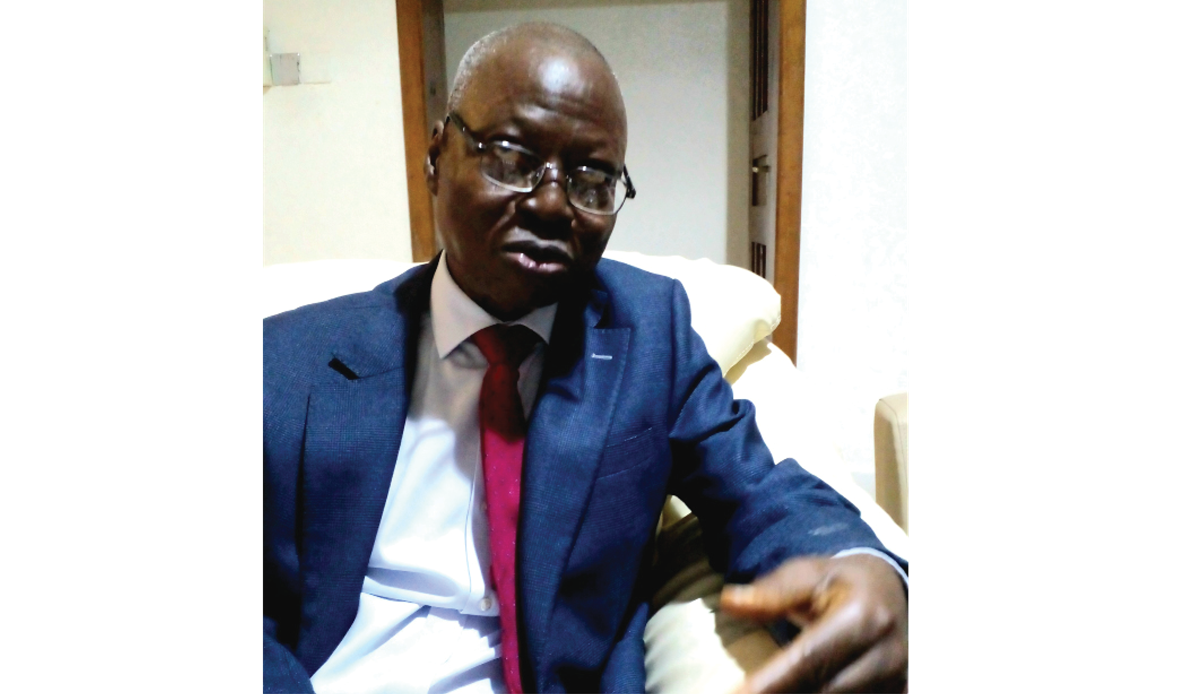Why govt is number one enemy of private institutions in Nigeria — Olatunji, Pro-Chancellor, Trinity University
By Tunbosun Ogundare
Copyright tribuneonlineng

Pastor Samuel Olatunji is the Pro-Chancellor\Chairman of Governing Council, Trinity University, Lagos. He shares insights, in this exclusive interview with TUNBOSUN OGUNDARE, into why government is the major enemy of private schools and why institutions such as CBN were unattractive to young graduates for employment back then, among other issues. Excerpts:
How would you compare the Nigerian education sector at the moment with that of the past?
The Nigerian education sector is about character, culture and work habits. Everything then and now is a contradiction. It’s not about the education then, but about the way of life of human beings; it’s about leadership, the community, and integrity. In the olden days, sellers put their goods by the road side with pieces of stones indicating their prices to let people know how much they were being sold. Everyone respected that practice. Even when a little girl was put in charge of watching over the goods, nobody would kidnap her, try to harass or manipulate things. The buyers bought the goods they wanted, leaving the money there and go on their way.
Can any seller do that today? So, it’s not just about education, every part of the system has lost its value; from agriculture to politics; education, culture and among others.
What motivated you to establish this institution and how was the beginning-like?
The motivation was in a bid to fill the gap that the government could not fill. The beginning was full of turbulence and threatening at the same time. Everything went wrong. The environment was hostile; there was paucity of funds, lack of enthusiasm and visionaries, dearth of people who were ready to make a difference and all that. However, we realised that the government is the number one enemy of private schools in Nigeria.
What do you mean by saying the government is the number one enemy of private schools in Nigeria?
The people in government feel they are in power and they can make things difficult for people to do. For instance, they make school approval process difficult for people. They don’t create an enabling environment for private institutions to thrive. They allow things to move forward seamlessly. They don’t celebrate success; rather they create hindrances and obstacles, for non-performance. It is so frustrating.
But many in government believe that running a private institution is solely for money-making, how would you react to that?
I see. Then, let them come into it and make that money? Like I usually say, my generation went to good schools and they were all public schools, but now we can’t give our children the kind of education that we received in public schools, hence some of us came in to fill that gap. We cannot keep complaining as that won’t solve any problem. For example, when we started our secondary schools, only our children dominated the school.
My first child was among the pioneering students of our school. This was what we all did to solve a problem that was beyond us. We knew other children would also benefit. In fact, today none of my children are in those schools other people’s children and that will continue from generation to generation.
You said that everything went wrong at the outset of establishing your school; could you shed more light on that?
Apart from the fact the government was against you, there was a time when half of our staff members including the one from my village resigned the same day. Almost everything we were using in the school was donated; the piano we were using was from my house.
Could you believe that when we resumed for the second year, while the students and every other person in the hostel were attending a church service very early on Sunday morning, the security guard brought in a trailer and carted away everything that could be removed from the school. He also went to the principal’s office and removed his personal file and went away with it. Meanwhile those items we contributed to assist us. All of that happened to a new school that was budding. Three years later, one of the staff ran into the security guard somewhere in Mile 2 in Lagos, grabbed him and started shouting thief! Thief!, repeatedly to harass him. This was someone we gave a job opportunity that did that to us. So, it was a bit tough. We borrowed money from the bank and we couldn’t pay back. The bank believed that we were not just being honest. At some point, we had to go and prostrate before the MD of the bank. It was very rough.
What is the situation like today?
It’s been worth it; very fulfilling in many respects and I thank God for everything. Today, somebody doing well in society can boast that he or she is a product of our school. That alone gives me joy. On my birthday anniversary last year, one of the girls who couldn’t pay her school fees back then and the school offered her scholarship including accommodation asked people for my bank account number. At the end of the day, she sent N300, 000 to my account. This is a 25-year-old lady, who left us about 10 years ago. These are the kind of rewards you get in return for investing in education.
In this part of the world, paper qualification in terms of certificate seems to have priority over skills acquisition, do you agree?
About 99 per cent of Nigerians believe in that and that is why they go about forging all forms of certificates, even the kindergarten certificates. Someone said the greatest level of fraud in education is with the Nigerian Certificate in Education (NCE). I think the reason is that, it’s the easiest way to gain admission into the university. There are lots of forgeries going on now a day. There are so many professionals who cannot defend their certificates and as a result, they earn less pay than teachers. All this is happening because we’re not holding people accountable. As it is, there are many mechanical engineering graduates who cannot fix ordinary knots on their vehicles. They will have to consult the roadside mechanics to fix everything that is wrong with their vehicles.
How were fresh graduates rated during your time and compared to now that many may not get jobs several years after graduation?
There’s nothing to compare. I attended University of Lagos and I studied Accounting. I graduated in 1978. Nigerian universities then were world-class. The rating we enjoyed as graduates from UNILAG, for instance, was as good as any other gotten from world-class university across the globe. The professional examinations we were taking then as UNILAG products were affiliated with a university in the United Kingdom (UK). Our universities were well-respected and ranked better then than many universities overseas. That is the starting point and from there, everything follows. The quality of personnel, staffers, curriculum and every other thing has gone down.
Similarly, to get jobs then as graduates was not as difficult as now. By the time students get to 200 Level, big companies such as UAC, Mobil Petroleum would be coming to schools to scout for students who wanted to do holiday jobs. That was the usual practice that time. Former President Obasanjo tried to disrupt that when he came to power in 1976. Rather, he campaigned for the Green Revolution programme, where all undergraduates were asked to go to the farm and students were enrolled into various farms in different parts of the country for the three months holiday and all that. There was an instruction that no undergraduate should be taken for any industrial training job during the programme, but should be allocated to the farm to work. That was between 1976 and 1977. However, towards the end of 1977, we were allowed to work in the companies again. I remember working with Mobil Petroleum. At Mobil, any student who came for an internship job during the holiday would be given a letter when returning back to school for a permanent job. In fact, most of us had secured jobs before we graduated. However, then, there were also those we called the lay-about. They were the not very serious type. They were neither that enterprising nor making any serious effort to get a job at any of the high-profile companies. So, once such people finished with their one-year NYSC programme, and seemed to be stranded, there were three places they used to go for employment- Central Bank of Nigeria (CBN), Federal Ministry of Finance and the Nigerian Industrial Development Bank. Those places were like dumping grounds for those individuals at that time. These companies were all on Broad Street on Lagos Island. Once you have a certificate in your irrespective discipline, you are sure of getting a job.
Many private school operators at the tertiary education level believe that the Federal Government’s agencies such as the Tertiary Education Trust Fund (TETFund) are supposed to include private schools as beneficiaries; do you also share this view?
Now, let’s look at education as a commodity. If you send your children to school to study, certainly you will pay fees to get some certain services. When you pay for a Nokia phone, what you will get is a Nokia phone. This is a philosophy in education.
ALSO READ: Tinubu orders Fubara’s return, suspends emergency rule in Rivers
Education is a public good and that is why it is a social service. Even when somebody acquired a degree certificate be it from a public or private school, it is the society that will benefit more from his/her services.
When the industrial revolution started, there was a shortage of labour everywhere and that hampered the development and progress of the nation, so we started investing in different skills to empower them for industry and so forth.
Even though there are benefits you gain from educating yourself, at the end of the day, the greater benefit is for the larger society and community. Let’s look at it from this angle also; I established a school for people to attend, filling the gap for the government. Now, my own last child left the same school over 20 years ago but the school is still there, serving many other children.
So, if the society benefits more from education, then, the national fund should be for the benefit of every institution and not only for those owned by the government.
If you had the privilege of meeting President Bola Tinubu, what would you tell him to do in the education sector?
I will tell him nothing.
It is simply because there is nothing new that he had not heard before now. Those working with him across levels and the people in the MDAs and even in the National Assembly have been attending seminars upon seminars at home and abroad, so they know what to advise him to do on education matters. If only one-tenth of the advice suggested to him is carried out, our education sector will go far. Implementation has always been our major problem as a country. We all know what to do to make things better; we just don’t do them. All we need is vision, integrity and commitment. I won’t stress myself telling him anything. I will rather say, rather complain, let everyone rise up and do what they can to make the country better.



